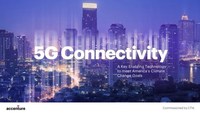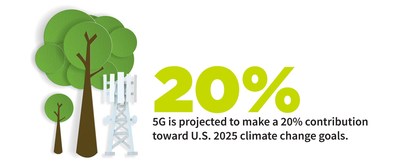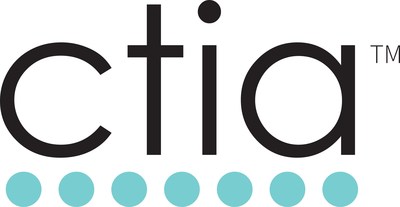5G-Enabled Technologies Could Solve for One-Fifth of U.S. Climate Change Target by 2025, New Study Finds
WASHINGTON, Jan. 26, 2022 /PRNewswire/ -- 5G connectivity will play a significant role in enabling the U.S. to meet the Biden Administration's climate change goals, with 5G-enabled use cases projected to make up to a
"This study confirms that U.S. 5G wireless networks will be instrumental in tackling the pressing challenge of climate change," said Meredith Attwell Baker, CTIA President and CEO. "America's wireless industry is building a world-leading 5G platform that will spur the investment and innovation necessary to meet our country's climate objectives."
The report, titled 5G Connectivity: A Key Enabling Technology to Meet America's Climate Change Goals, finds that use cases on 5G networks will enable up to 330.8 million metric tons of carbon dioxide equivalent (MMtCO2e) of additional abatement by 2025. That is the equivalent of removing
The report examined 31 use cases for 5G across five industry verticals: transportation and cities, manufacturing, buildings and energy, agriculture, and working, living and health. The report discusses the following three verticals in depth, where 5G will have significant downstream carbon abatement potential:
- Transportation and cities: 5G-enabled use cases in the ground transportation and cities vertical can total up to 86.5 MMtCO2e of carbon abatement in the U.S., thanks to reduced traffic congestion, reduced vehicle idling at signals and while parking, shorter routes optimization, and greater adoption and opt-ins of more sustainable choices such as public transportation. The carbon abatement in this vertical is equivalent to the carbon sequestered by 106 million acres of U.S forests in a year.
- Manufacturing: 5G-enabled use cases in the manufacturing vertical can total up to 67.4 MMtCO2e of carbon abatement in the U.S., thanks to enhanced inventory management, real-time asset monitoring, predictive maintenance, process augmentation, and travel avoidance. The carbon abatement from inventory management by 2025 alone is equivalent to removing CO2 emissions from 17 coal fired power-plants in a year.
- Energy and buildings: 5G-enabled use cases in the energy and buildings vertical can total up to 67.9 MMtCO2e of carbon abatement in the U.S., thanks to real-time monitoring, increased green energy use, fuel savings through reduced transport facilitated by remote operations, building energy management systems, commercial HVAC controls, smart meters and smart grids, and renewable microgrids. The carbon abatement from energy and buildings by 2025 is equivalent to removing CO2 emissions from electricity consumed by 12 million homes in a year.
"This study shows 5G networks can bring material reductions in our country's carbon footprint," said Peters Suh, Accenture's North America Communications and Media industry lead. "The crucial piece will be how industries leverage cloud-first 5G networks to bring greater innovation into key operational processes. With appropriate education and ecosystem changes, organizations can reap the climate benefits of 5G across their cloud continuum, which includes everything from the public cloud to the edge."
"U.S. 5G networks already cover 305 million people, we're building out 5G faster than we built out 4G, and every day, the wireless industry is working to make these networks go faster and farther," added Attwell Baker. "Taken together, America's wireless ecosystem is positioning U.S. innovators across these key industry verticals to quickly unlock these climate benefits."
Report Methodology
Accenture developed a carbon abatement model to quantify the potential incremental carbon abatement opportunity of downstream use cases enabled by 5G networks. The Accenture model is an adaption of the published methodology and use case analysis created by GSMA in "The Enablement Effect" report. A total of 31 use cases where 5G could be leveraged by mobile technology to reduce carbon emissions were identified. Accenture then calculated the avoided emissions for each case using an avoided emissions factor, a 5G-driven quantity variable, and a 5G downstream enablement multiplier.
A copy of the report can be downloaded here.
About CTIA
CTIA® (www.ctia.org) represents the U.S. wireless communications industry and the companies throughout the mobile ecosystem that enable Americans to lead a 21st century connected life. The association's members include wireless carriers, device manufacturers, suppliers as well as apps and content companies. CTIA vigorously advocates at all levels of government for policies that foster continued wireless innovation and investment. The association also coordinates the industry's voluntary best practices, hosts educational events that promote the wireless industry and co-produces the industry's leading wireless tradeshow. CTIA was founded in 1984 and is based in Washington, D.C.
About Accenture
Accenture is a global professional services company with leading capabilities in digital, cloud and security. Combining unmatched experience and specialized skills across more than 40 industries, we offer Strategy and Consulting, Interactive, Technology and Operations services — all powered by the world's largest network of Advanced Technology and Intelligent Operations centers. Our 674,000 people deliver on the promise of technology and human ingenuity every day, serving clients in more than 120 countries. We embrace the power of change to create value and shared success for our clients, people, shareholders, partners, and communities. Visit us at accenture.com.
Accenture's Communications and Media industry group helps communications service providers, as well as media and entertainment organizations become leading providers of next-generation IP services and immersive customer experiences. To learn more, visit https://www.accenture.com/us-en/industries/communications-and-media-index.
![]() View original content to download multimedia:https://www.prnewswire.com/news-releases/5g-enabled-technologies-could-solve-for-one-fifth-of-us-climate-change-target-by-2025-new-study-finds-301468845.html
View original content to download multimedia:https://www.prnewswire.com/news-releases/5g-enabled-technologies-could-solve-for-one-fifth-of-us-climate-change-target-by-2025-new-study-finds-301468845.html
SOURCE CTIA










